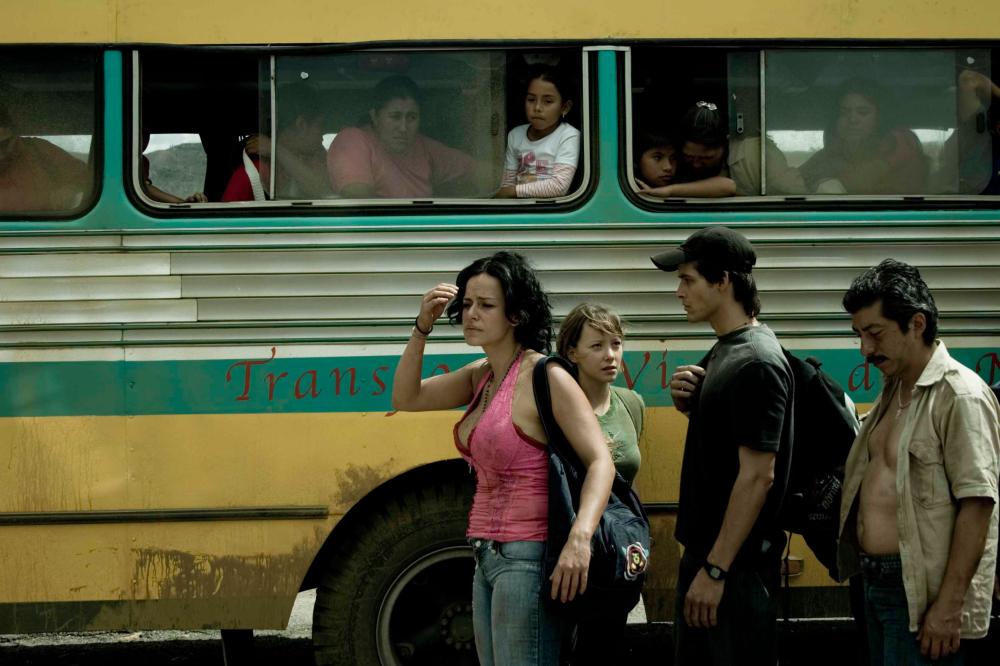Paraiso doesn’t glorify the anguish illegal immigrants experience with a happy ending or a triumphant win. The horrific journey of Marlon and Reina, two-18-year-olds in lust played by Aldemar Correa and Angelica Blandon, felt bona fide. The couple sneaks into the States without visas, opting to give up their fairly comfortable middle class lives and families back home. They take this risk based on an idea they have about the U.S., an idea they’ve invested in. It’s the notion that life in the U.S. is much, much better than life back in Colombia will ever be. Like several other Colombians with these high hopes, they all enter an agency called “Paraiso Travel.” They each pay the shady $3,000 for what the agent describes as a resort-like travel vacation. In reality this is a hellish life-risking experience complete with rape, murder, theft, torture and tragic exploitation.
There’s a scene where the surviving members of the group finally arrive after the treacherous crossing of Guatemala’s and Mexico’s borders. They’ve just suffered the last leg of border crossing in a long, suffocating journey stuffed into carved out logs for the ride from Mexico to Texas. Once they cross the border they are wrenched out of those innocent-looking logs and tossed to the ground — ill, one Colombian dead. Sounds like an adventure movie, but it’s an scarring image too specific not to be real.
To witness the lengths they go to enter an “idyllic” country and the inevitable tragic challenges that actually lay ahead is a solid reminder of what illegal immigrants endure daily.
I’ve traveled through Guatemala and Mexico and crossed both borders by bus and foot — only I was with papers. My own experience was unnerving. I can only fathom what it’s like to give everything up with no idea of what I was getting into, and then to be met with so much disappointment.
Re-looking at New York through the eyes of Marlon, I felt such compassion and pause for the assault of New York City on those not knowing what to expect. Watching Marlon exclaim: ‘Every street looks the same!’ and witnessing his bewilderment as to how he could so permanently lose Reina (Queen in Spanish) in a place called Queens truly felt genuine. It reminded me of taking crowded chicken buses through Central America and Mexico and marveling at how we’d be winding up mountains and through cloud forests, or off-roading through the jungle in what felt like the middle of nowhere. There were no homes within sight. Inevitably the bus would suddenly jerk to a stop. Stepping onboard would be a man with a machete, or a family with bundles of food (living and dead) in packs three times their size. They were just taking their daily route, following their routine. What locally was known as a bus stop, I certainly would never have recognized. All the bends look the same!
The idea of arriving somewhere so foreign and confusing without directions, and not knowing anyone or the language is a really harsh and scary reality. The little things I am so dependent on and so lucky to have — from owning a cell phone and having Internet access to even having a contact to call and people reach out to email, are hard details I can’t comprehend living without. Without those details it makes sense that Marlon and Reina lost each other in the Big Apple. With a heavy heart this film made me really think about what is exactly involved individually in the lives of new immigrants who continue to come here and continue to struggle without a plan beyond making money to send back home. I thought about how often new immigrants cross into my own life. I ride in their cabs. They deliver my dinner. They clean what I don’t want to clean. They are willing to do what most U.S. Americans are no longer willing to do.
As I reflected on all of this, I felt overwhelmed with guilt for how paltry my tips are to delivery guys and cab drivers. How I tip $8 after a laborious $40 massage at a Chinese parlor and $6 after a lengthy $27 pedicure. I found myself wondering why I prioritize giving a nice tip to my bartenders, waiters and hairstylist, but not to the other people I depend on for a bargain and hustle for a buck or two.
Recently I sat in the cab of a lovely Haitian man. Not one to sit silently in the back, I started speaking with him about what Haiti was like during Papa Doc’s reign and we waxed about how in developing nations folk have short memories. A leader can be responsible for the vicious murders of family members, but if he installs a soccer field, builds a new school and improves health care in a community, he will be remembered and revered as a hero. My cab driver made it clear how pleased he was that I knew even the slightest thing about his homeland. After ten minutes sitting in the cab in front of my apartment (meter off of course!) he said for me to forget about paying him. The ride was on him. I refused and reluctantly he took the fare. He ended our conversation with: “You know, I didn’t even know at first that you were talking to me when you asked me how I am doing. No one ever asks me that.”


